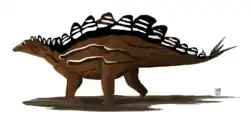Stegopodus
Stegopodus was a new ichnogenus erected in 1998 for the second set of stegosaur tracks from the Morrison Formation.[3] The tracks were found near Arches National Park, also in Utah.[3] Unlike the first, this trackway preserved traces of the forefeet. Fossil remains indicate that stegosaurs have five digits on the forefeet and three weight-bearing digits on the hind feet.[3] From this, paleontologists were able to successfully predict the appearance of stegosaur tracks in 1990, six years in advance of the first actual discovery of Morrison stegosaur tracks.[3] Since the erection of Stegopodus, more trackways have been found, however none have preserved traces of the front feet, and stegosaur traces remain rare.[3]
| Stegopodus | |
|---|---|
 | |
| Life restoration of Stegosaurus, the possible trackmaker of Stegopodus | |
| Scientific classification | |
| Kingdom: | |
| Phylum: | |
| Class: | |
| Superorder: | |
| Order: | |
| Suborder: | |
| Infraorder: | |
| Family: | |
| Genus: | †Stegopodus |
| Binomial name | |
| †Stegopodus czerkasi Lockley, Hunt & Foster, 1998[2] | |
Footnotes
- http://fossilworks.org/?a=taxonInfo&taxon_no=294824
- http://fossilworks.org/?a=taxonInfo&taxon_no=294825
- "Walk and Don't Look Back: The Footprints; Stegosaurs" Foster (2007) pg. 238
References
- Foster, J. (2007). Jurassic West: The Dinosaurs of the Morrison Formation and Their World. Indiana University Press. 389pp.
This article is issued from Wikipedia. The text is licensed under Creative Commons - Attribution - Sharealike. Additional terms may apply for the media files.